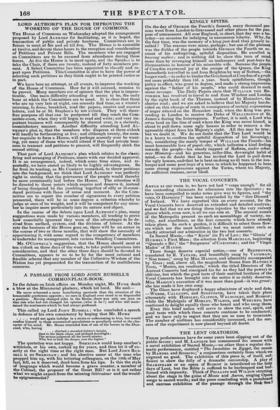KINGLY SPITES.
ON the day of GEORGE the Fourth's funeral, many thousand per- sons went from London to Gravesend and other places for the pur- pose of amusement. All over England, in short, that day was a ho- lyday—an occasion for indulging in uncommon hilarity. Why, for the first time, was the memory of a king just dead thus grossly in- sulted? The reasons were many,-perhaps ; but one of the plainest was the dislike of the people towards GEORGE the Fourth on ac- count of his unforgiving, spiteful disposition. He excelled in bearing malice; and in nothing did he show this turn of mina more than by revenging hirnself on innkeepers and post-boys for illuminations in honour of his miserable wife. Because the people of Croydon expressed joy at the escape of the Queen, the King thenceforth travelled to and from Brighton by way of Sutton,—the longer road,—in order to hinder the Greyhound at Croydon of a profit not more probably than 10/. a year. Such spitefulness, though paltry in effect, was great in degree, and made a strong impression against the "father of his people," who could descend to such mean revenge. The Daily Papers state that WILLIAM THE RE- FORMER has resolved to travel to and from Windsor and London by right bank of the Thames, instead of by Hounslow, the shorter road; and we are asked to believe that his Majesty has de- cided on this change of route in consequence of certain expressions of anger uttered on the Hounslow road, when the King was pro- ceeding to London to receive the Duke of WELLINGTON at St. James's during the Interregnum. Further, it is said, a Lord who ,owns land on the line of road where the King was never hissed, is about to pull down some ugly houses in order to remove a dis- agreeable object from his Majesty's sight. All this may be true ; but we doubt it. We do not doubt that the Tory Lord would be in a hurry to confirm the spiteful disposition of his Sovereign; but, considering the manly temper of WILLIAM the Fourth—his most honourable love of popuVrity, which indicates a kind feeling towards the people—his steady support of Reform, under what- ever Ministry—and his generous, sailor-like, downright habit of mind,—we do doubt that he has invited the Lord to pull down the ugly houses, andtthat he is bent on doing an ill turn to the inn- keeper and some post-boys of a town in which he happened to hear. some strong expressions against the Tories, whom his Majesty, for sufficient reasons, never liked.














 Previous page
Previous page